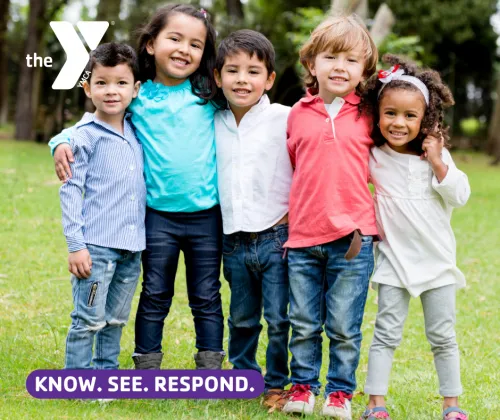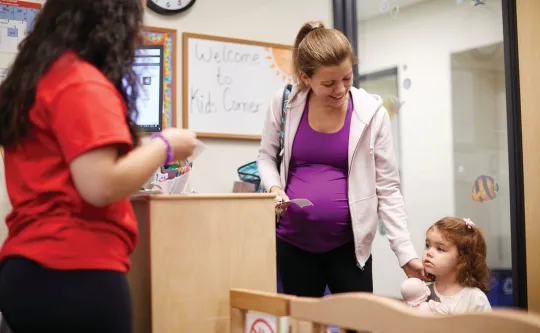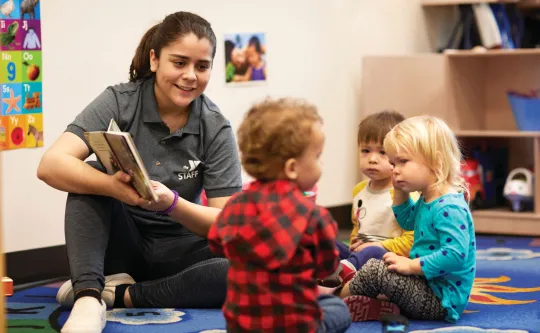APRIL IS CHILD ABUSE PREVENTION MONTH!
Please join us in learning about and sharing information about this important issue.
Child Abuse Prevention and OUR Responsibility
Protecting the rights of children is a social responsibility that we all share. While it is distressing to confront these violations, opening the conversation can help to prevent abuse from continuing behind closed doors. Raised awareness might also enable children affected by abuse to identify the signs and feel better supported to seek help.

The Y's Commitment to Protecting Children
We thoroughly screen our staff and volunteers, including criminal background checks.
We train all staff in abuse prevention.
We carefully supervise and monitor our programs.
We teach children about appropriate and inappropriate touch through personal safety talks.
We have policies to limit circumstances for staff and volunteers to be alone with a child or teen.
We have policies that limit staff contact with children and teens outside of the YMCA programs.
Our Goals
To demystify the process of reporting.
To help create a community where our most vulnerable populations feel safe.
To provide education around child abuse where it is needed in our community.
* If you have a concern about abuse at the YMCA and would like to make an anonymous report, please click here.
YOUR KNOWLEDGE STARTS HERE

What You Can Do
Know. See. Respond.
Educate yourself. Learn what child abuse is, how to recognize it and what you can do as a member of the community to prevent it. Start with the videos and information on this webpage.
Why it Matters
Child abuse and neglect are common. At least 1 in 7 children have experienced child abuse or neglect in the past year in the United States. A child exposed to maltreatment or violence is at much greater risk of developing emotional difficulties and mental health problems as they grow up.

Educate Yourself
Below you will find 5 printable documents to help you and others learn more about child abuse, prevention and intervention. Click the titles to view.
Basics About Child Abuse (KNOW)

Get Certified
You have the power to protect
children in your life!
Take Stewards of Children®, by Darkness to Light, child abuse prevention and education video training program. The YMCA of Jefferson County's, Children's Advocacy Center, has secured free "seats" for our community members to take the training at no cost to you. This training will provide valuable tools that will help you take action and help reduce instances of child sexual abuse in our community. Get certified now.
RESOURCES
If you suspect someone under the age of 18 is being abused or neglected, or is at risk for abuse or neglect, you should make a report to your local Department of Children, Youth and Family (DCYF) office or call 911.
How to Report Abuse
1. Call 911 and the Department of Children, Youth & Families at 1-866-ENDHARM
(1-866-363-4276), Washington State’s toll-free, 24 hour, 7 days-a-week hotline.
2. When calling, please provide as much information as possible. The more accurate information you provide, the better equipped professionals will be to assess the child’s safety:
- Name, birthdate, and address of the child.
- Name, address, and phone number of the child’s parent or guardian.
- The nature and extent of the abuse or neglect.
- Any evidence of previous incidents.
- Identity of the perpetrator.
- Any other information which may be helpful to establish the cause of the child’s abuse or neglect.
Parent Education Videos
What you need to know:
Abuse and Warning Signs (4:32)
Talking to Your Child (4:42)
How to Respond (7:00)
Red Flag Behaviors
Red flag behaviors that could be a sign of grooming:
The national center for Victims of Crime states the perpetrators may use grooming behaviors to gain the trust of a child and their guardians in order to gain access to a victim and create a relationship that is grounded in secrecy to lessen the chance of disclosure. Although any one sign may not indicate a grooming pattern, it is important for adults in our community to recognize these behaviors if they are happening.
- Being fixated on a child.
- Excessive gift giving.
- Finds opportunities to be alone with a child.
- Does not respect boundaries set by the child or the parent.
- Shares stories about their romantic lives.
- Talks with a child without the parents knowing.
- Helps with personal grooming when a child can do it.
- Wrestles with children inappropriately.
- Comments about a child's physical appearance.
Creates secrecy around a relationship with a child.
Pledge to Protect: End Child Sexual Abuse
What's OK?
What's OK? is a non-profit organization that has worked for 30 years to help keep children and youth safe from sexual harm. Their website and helpline is for young people (14-21 of age) who have questions about sexual thoughts, behaviors or interests.
Looking for more information about What's OK? Contact the team behind the site at info@stopitnow.org.
Take the Quiz
Take our Child Abuse Prevention and Education TRUE or FALSE Quiz!
Jefferson County Children's Advocacy Center (CAC)
Find out more information about the work we are doing in development of our Jefferson County Children's Advocacy Center.
